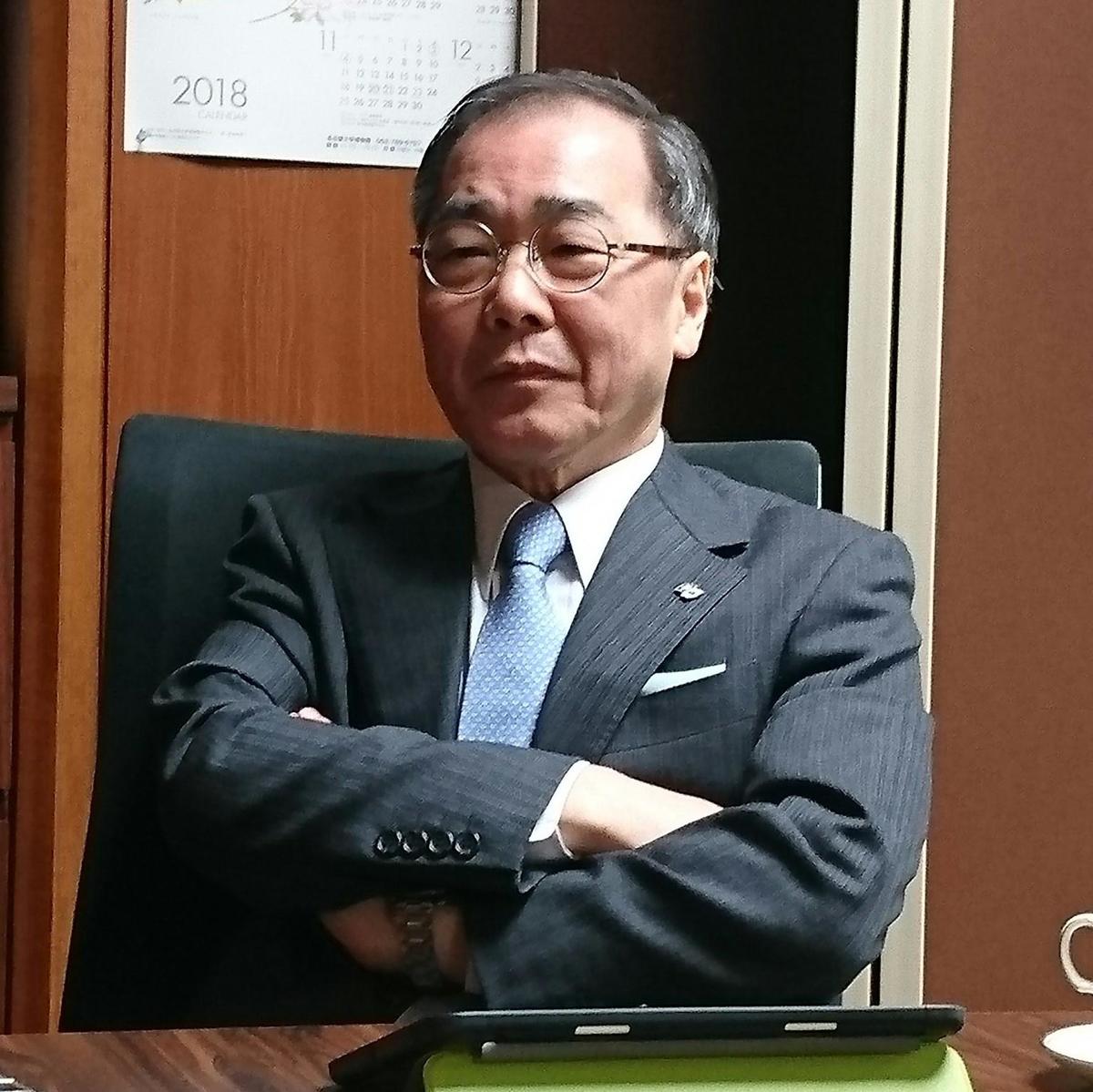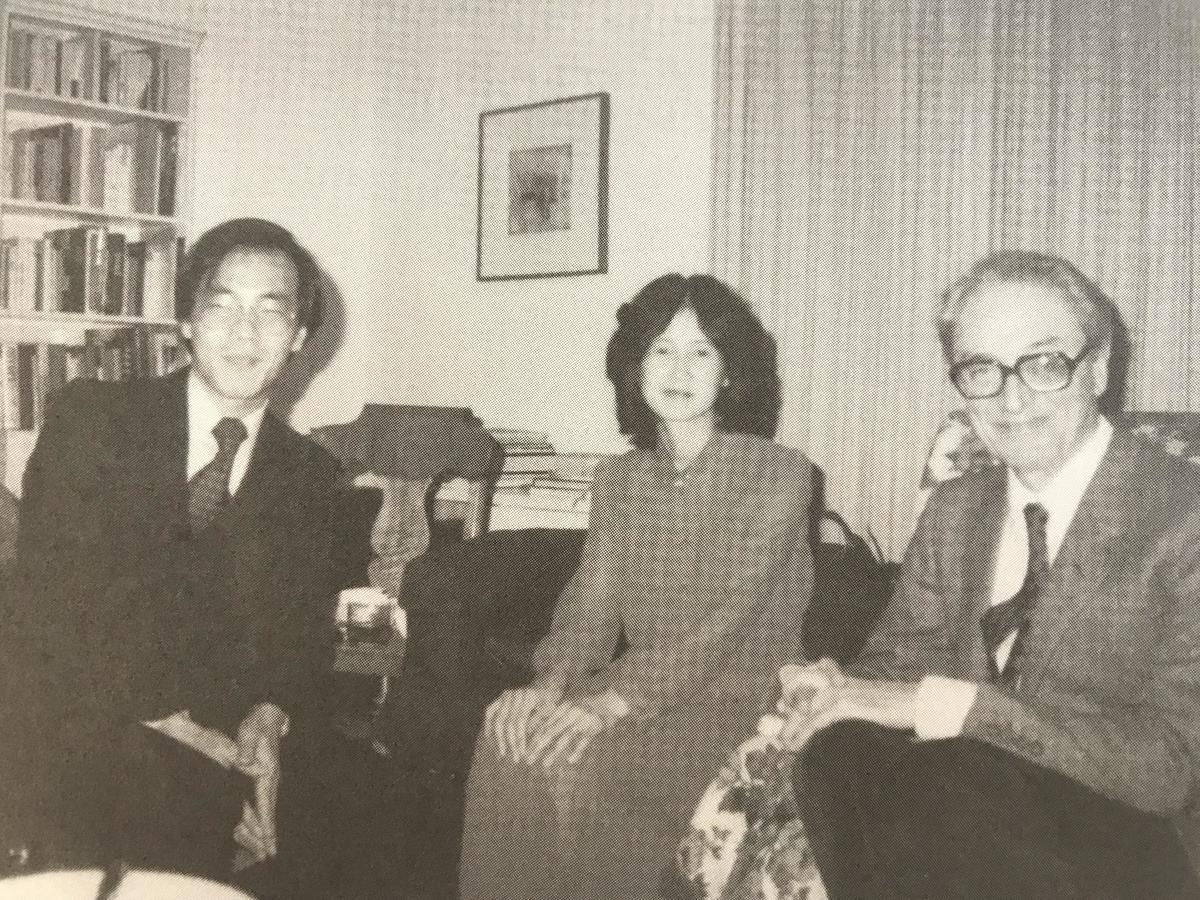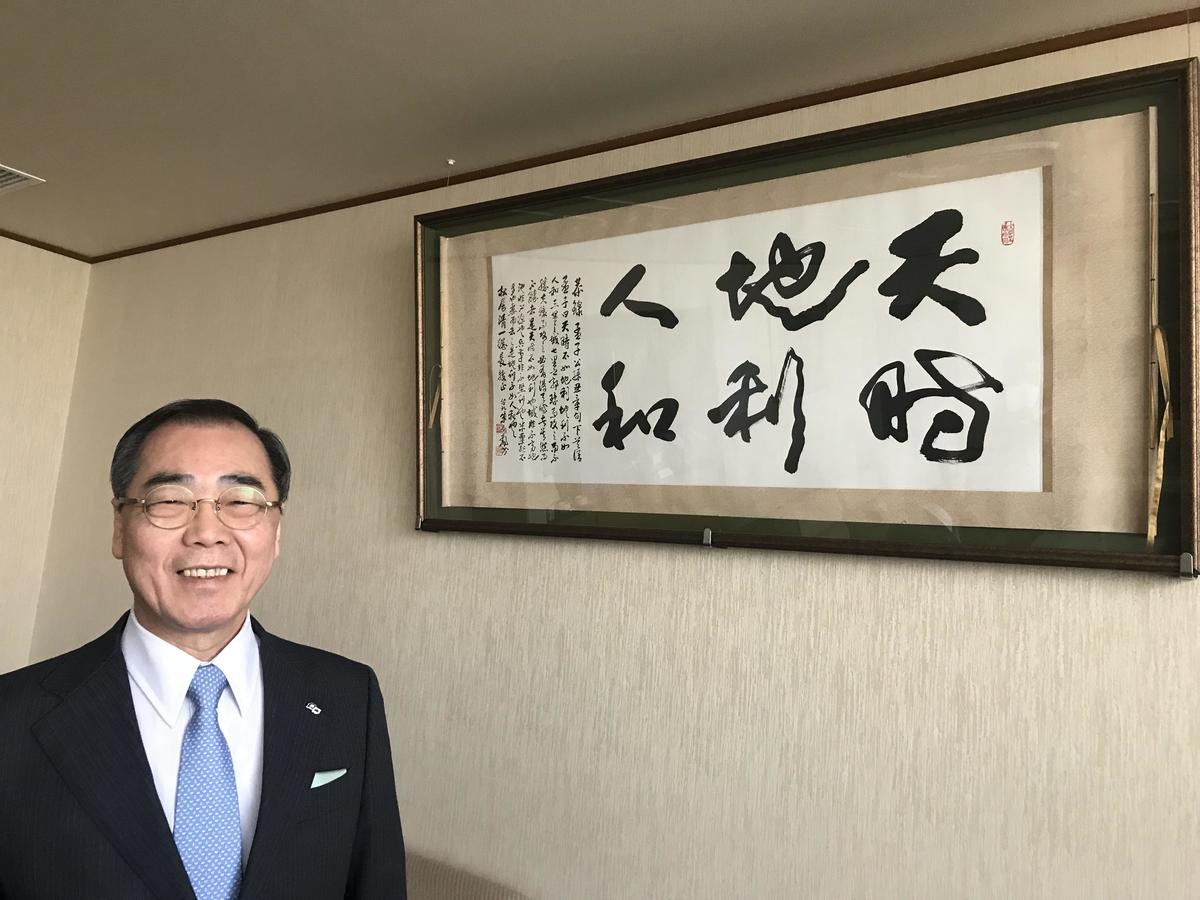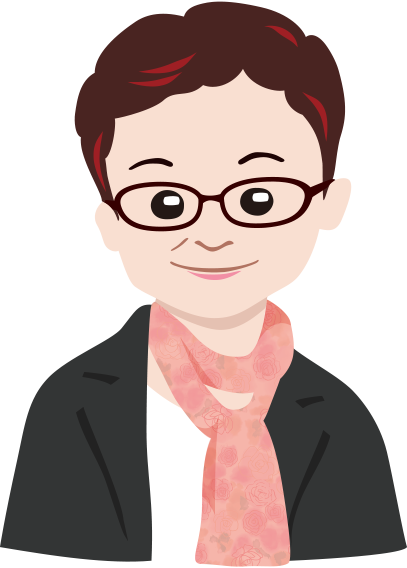March 6, 2019
Moving Forward with Great Ambitions
The Past and Future as Told by President Seiichi Matsuo
Since entering Nagoya University in 1970, President Seiichi Matsuo has spent nearly half a century at the school -- with the exception of his time studying in the U.S. and working at a hospital. His connection with Meidai grew from his start as a student of medicine; he went on to become a professor at the university hospital, then director, the head of Industry-Academia-Government Collaboration, and now president of the university. Currently, as an executive member of the government's Council for Science, Technology and Innovation (CSTI), he is also in a position to see the university from the outside. How has his view of Meidai changed, and what is in store for its future?
(Interviewed by Atsuko Tsuji)
 ”I’d like to hear from as many people as possible, from far and wide.”
”I’d like to hear from as many people as possible, from far and wide.”
--What are your thoughts looking back at the past half century?
Matsuo: When I returned from studying in the U.S. after graduation, I had become a completely different person. Before I left, I was the type who tended to accommodate myself to circumstances and depend on others. In the U.S., I was forced into situations where I couldn't move forward unless I forged the way myself, and it was the first time I acted of my own volition. I guess you could say my mindset changed. It's something that's still a part of me today.
--Why did you come to Meidai from your high school in Hyogo Prefecture?
Matsuo: I was a really serious rural high school student. When I graduated in 1969, it was the year the University of Tokyo had stopped admissions because of the student riots. Influenced by my physics teacher, I wanted to go into research. When I went to take the Kyoto University Faculty of Science exam, the area around the university was littered with stones and we had to be protected by riot police when we entered the testing site. It made me realize that there is a completely different world. At breakfast in the hotel, I poured what I thought was ketchup all over my egg, but it was actually tabasco sauce, and it was so spicy it knocked my socks off. That's how naive I was. At that time the student demonstrations in Tokyo, Kyoto, and Osaka were constantly reported on TV. I felt I didn't want to go to such a crazy place, and the following year chose Nagoya instead. Just like nowadays, at the time there was absolutely no news about Nagoya. It was only after being admitted to the school that I learned how the university had been blockaded and classes cancelled the previous year, and that it had just reopened. I was astonished to see students practicing fighting drills on campus. Although I wanted to go into science, while preparing for entrance exams I read tons of books, including classic and Chinese literature, and I remember how it was fun to study even through my Japanese language grades weren't so good.
--Why did you choose to study medicine?
Matsuo: I wanted to live freely, and as a high school student in the countryside, I imagined that doctors could live an unhindered life. The reality of this was also different.
--What were your years at university like?
Matsuo: The demonstrations were still going strong, and it wasn't a relaxing atmosphere to study in, so I didn't do much of it. I joined the School of Medicine rugby team, but broke a bone and couldn't practice, so I started singing folk songs with people from outside of the university and joining music clubs. Postgraduate clinical training at Meidai was organized by students, including which hospital they would go to, and I played a role of class representative for the training. I was also lacking in initiative when it came to choosing a specialty; a friend told me that nephrology was promising, so I checked out a hospital, liked it, and decided to do it. This was back when dialysis had started saving lives, and I thought I could be of service to society whether doing research or clinical. I set my sights on regional medical care and wanted to go to work in a local region as soon as possible, but then I got told to go to graduate school. So I entered graduate school. Even I have to admit that I was lacking a backbone. At the time, hematology was on the cutting edge at Meidai hospital, but I had absolutely no idea.
--And what happened during those fateful years in the U.S.?
Matsuo: Here too, I was told to go to New York, so I did, but I had nobody to depend on and it was different from what I'd wanted to do. I had a really hard time. An Italian student in the same lab said, "If you want to transfer, you should ask your target professor at an evening wine seminar during an academic conference." I tried this, but it didn't work out. A year later, I was on the verge of going back to Japan when I was introduced to a professor and we really hit it off. This was Giuseppe Andres, who became my lifetime mentor, and I transferred to Buffalo where he taught. As a mentor I could deeply respect him. He was truly the greatest teacher. During my year in New York the only thing I had in abundance was time, and I spent many days at the library reading a mountain of papers on kidney pathology. Thanks in part to this knowledge, I got better results at Buffalo, I built up trust with my professors, and was also put in charge projects. I had a paper published in a leading magazine on internal medicine, and it apparently even garnered attention in Japan. I stopped thinking about the future, and totally devoted myself to research for two years and two months. My first professor in New York recommended me to Professor Andres, even though he'd normally look down on someone who'd just arrived and said they wanted to transfer. I'm really grateful for it.
--And you were a different person when you came back to Japan?
Matsuo: I didn't realize it at the time, but looking back I think I had become a different person. I began to act of my own accord. I had wanted to continue my research in Japan, but this was right when the medical system was going through big changes, and from the time I became an associate professor at the School of Medicine, I became involved in various reforms. First, the postgraduate clinical training system was reformed into new one based on the student-focused Meidai-style system I had worked on, where students are rotated through all departments. Taking responsibility at the university this time, we established the Center for Postgraduate Clinical Training and Career Development, and I managed it as the vice director. This new Meidai system also became government policy. Next, I worked together with younger colleagues to drive reform of the number-based internal medicine system into an organ-specific one. During my term as hospital director, we created the first faculty post in a national university for the subject of medical safety, and invited Dr. Yoshimasa Nagao. At that time, there had been a medical accident where it had taken a year and a half to settle the compensation issue due to the inadequate initial handling, and it increased the momentum of essential reform to create a strong and independent department for medical safety. I brag that both the scale and substance of the department are one of the best, if not the best, in the country.
 With his life-long mentor, Giuseppe Andres, during his time studying in Buffalo
With his life-long mentor, Giuseppe Andres, during his time studying in Buffalo
--Was it quite a leap going from the hospital to industry-academia collaboration?
Matsuo: Yes it was. When I was hospital director, I was involved in new medical technology and pharmaceutical research. As a core hospital, Meidai should be in the position to further government projects, but in the beginning we repeatedly failed in such competitions, and as hospital director I was blamed for failures. It was only two years later when we finally succeeded. This is the result of learning from our mistakes, and realizing we need to thoroughly understand the meaning of a project and intention of a government policy to provide accurate support. Through these processes I learned the importance of industry-academia cooperation, and dissolved the existing organizations to establish the Center for Advanced Medicine and Clinical Research as the better organization to further practical implementation. Perhaps because of this kind of experience, former president Michinari Hamaguchi gave me the additional post of vice director of Industry-Academia-Government Collaboration during my final year as head of the hospital. Doing each job required from me 150%, so it was a challenge.
--And then you took full responsibility for Industry-Academia-Government Collaboration.
Matsuo: Because I come from a medicine background, to be completely honest I didn't understand engineering or science. But it was then that the Akasaki patent expired for blue LEDs that had brought in more than 200 million yen in revenue every year, so our patent income suddenly dropped from number one to 28 and didn't recover. Although we were winning one Nobel after another and Meidai's basic research was considered incredible, and despite the fact that we're based in the center of manufacturing, our industry-academia collaboration record was really poor. Seeds for industry-academia collaboration are born from basic research, and there are many things that a professional will find interesting even if the researcher himself doesn't realize. In order to provide systematic support for societal implementation, we made organizational reforms to integrate separate elements, like basic research support, industry-academia collaboration, and Universities Research Administrator (URA). Based on my previous experience, I knew that the form of the organization itself was important in addition to individual effort. There was some resistance, but we managed a rapid recovery. By reforming the organization and simply changing the way things were done, collaborative research with companies tripled within five years.
--Your experience in organizational reform at the hospital came in handy.
Matsuo: Yes, I think so too. I've been making reforms for over 20 years now. Perhaps it's an unfortunate trait of mine, but when I go somewhere and listen to people talk, I immediately think about what the organization's problems are, and what they could change to improve it. Make no mistake, there are many who find this a real nuisance and think, "We've been doing it like this for so many years, who's he to barge in and tell us to change?" Right now I have a responsibility as the university president. Change doesn't happen overnight, so the important thing is to share ownership of goals and ambitions, to agree on a methodology, and to act together based on mutual understanding and trust. If the organization changes, so does our mindset. Even when things don't go smoothly at first, if we continue to hone and refine the organization, results will improve soon enough. If this is done, I believe great things are possible.
--Has the way you view the university changed since you've come to look at it as a whole?
Matsuo: In the School of Medicine, we did clinics during the day and research at night, and felt like we were the ones working hardest and earning the most. We also thought medicine was the most important field of study. This has indisputably changed, and I've come to see the university and the world in general in a comprehensive way. All fields of study are important in changing society, and this is something that I sense, not just think in my head. More than anything, it's made me realize that Meidai still has some hidden resources. On the other hand, I think we have an unfortunate stereotype that is hard to shake off, with rankings like seventh of the former Imperial Universities, eighth in operational subsidies, and tenth or eleventh in number of undergraduate students. There are also people who think it's impossible to grow as long as operational subsidies are falling. The most important thing is our ambition -- what we aim for. Each individual is trying their best now, but Meidai can become even stronger when we have great ambitions and develop a positive mindset.
--What about the humanities and social sciences?
Matsuo: I can't say yet that I understand completely. But what I can say is that the humanities are not different from the sciences in the sense that basic research done with free idea is important and it's the university's mission to put those results to work and change society. The humanities may get a bad rap from the government and industry because they're relatively closed off. They need to put themselves out there more. In the midst of such rapid changes, without the power of the humanities and social sciences, the future design of society won't come together well. Technology alone will not deliver us solutions. I think it's necessary for the humanities and social sciences to become stronger. While there is a small overall number of teaching staff in the humanities at Meidai, it has the largest ratio compared to sciences of all the former Imperial Universities. I want them to display their strength in full.
 Work from a Taiwanese calligrapher with words that embody Matsuo’s present mindset: ”Opportunities of time vouchsafed by Heaven are not equal to advantages of situation afforded by the Earth, and advantages of situation afforded by the Earth are not equal
Work from a Taiwanese calligrapher with words that embody Matsuo’s present mindset: ”Opportunities of time vouchsafed by Heaven are not equal to advantages of situation afforded by the Earth, and advantages of situation afforded by the Earth are not equal
--How is the university viewed at places like the Cabinet Office's weekly CSTI that you attend?
Matsuo: The Ministry of Finance (MOF) in particular feels a strong sense of impending crisis regarding the state of the country in general, and apparently thinks that national universities may not have a sufficient grasp of the danger. The ministry thinks that, while universities receive so many operational subsidies, they aren't taking bold steps to change anything themselves. So it's pressuring schools into reform, so to speak, by demanding better numbers and improvement. But while the ministry is trying to reduce the number of universities, it's not necessarily trying shut them down. It's trying to strengthen the function of universities in its own way. I've given my say on this, but I strongly feel that our explanation of how universities are changing and demands for governmental support are not being heard. As a result, universities become engaged in disputes with the MOF. What's necessary now is to show them by actually doing things. That's also the aim of the three pillars of management reform that have been proposed within the university. We showed them our partnership with Gifu University by actually doing it, and got it drafted into a bill. The first time you try, you may get punched and kicked, but nothing will progress without a step forward.
--What's the aim of the Tokai National University System that will be formed through integration with Gifu University?
Matsuo: To strengthen the function of Meidai, I think cooperation is our only choice. Universities like Tokyo, Kyoto and Osaka are on a completely different scale. If our university can't make it alone, we'll create a platform together with Gifu. With education as well, if we tried to cover all fields of economics by assigning one professor to each, for example, we couldn't do research. So we cooperate to make education more beneficial for students, and each continues our outstanding research. When thinking in terms of the three types of universities set by MEXT, our two schools are primarily categorized as a university for regional contribution and an internationally-competitive university, but that's not necessarily the case for researchers. If each university was a trapezoid with its own special characteristics, then putting them together would complement one-another -- essentially, we're thinking of integrating those functions into an organization. We'll contribute to the local region, and compete internationally because regional manufacturing these days definitely doesn't end in the regional area. It would be great if, while working together, the consciousness of our two schools really joined together. One plus one equals three -- the key is whether we can accomplish that kind of consciousness. In the field of agriculture, the idea of Tokai Agricultural Station has been put forth to achieve widespread engagement, from basic research to distribution. The idea is to include private regional universities and think simultaneously about both Japanese and globalized agriculture.
I believe this kind of concept and large scale cooperation is essential for the future of Meidai. If 'Tokai' can become a desirable alma mater in the future, the rankings will likely also change, and there's a possibility that we could become a world-leading school, even though we may be a university cluster. At the same time, we would be supporting local regions and society, making it easier to gain returns, and making even more development possible. Maintaining that kind of positive environment for a number of years would make us an unbeatable university. That's what I believe.

 Subscribe to RSS
Subscribe to RSS